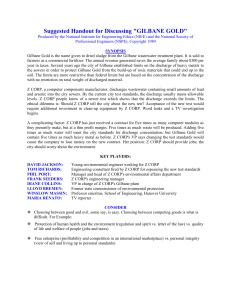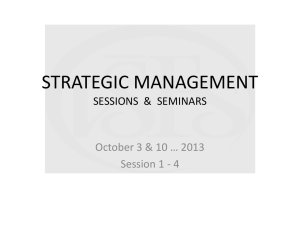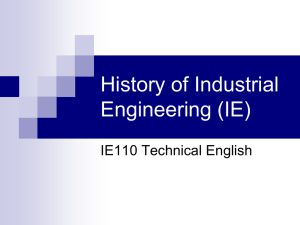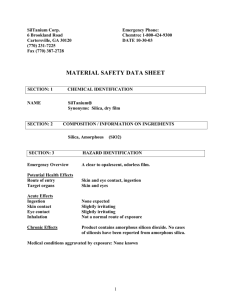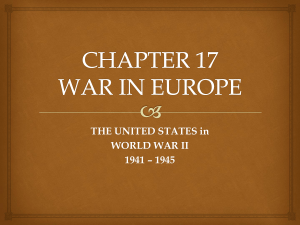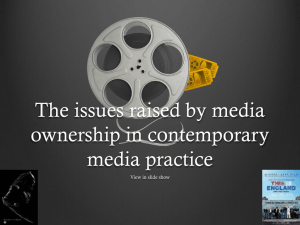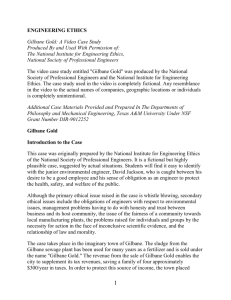Word
advertisement
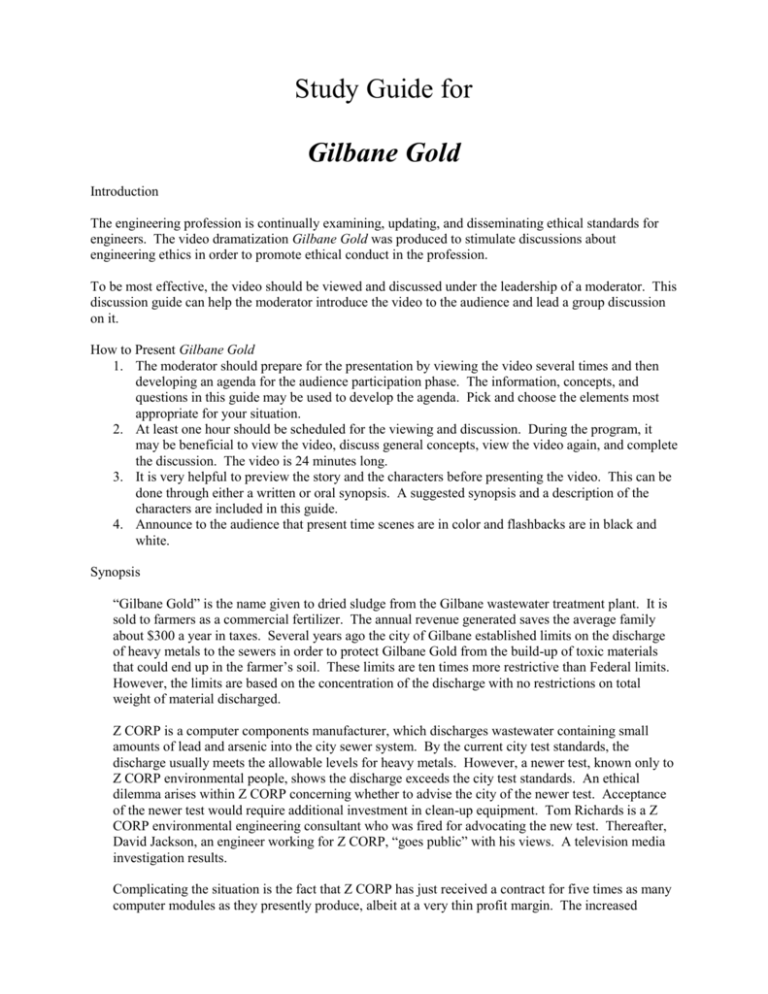
Study Guide for Gilbane Gold Introduction The engineering profession is continually examining, updating, and disseminating ethical standards for engineers. The video dramatization Gilbane Gold was produced to stimulate discussions about engineering ethics in order to promote ethical conduct in the profession. To be most effective, the video should be viewed and discussed under the leadership of a moderator. This discussion guide can help the moderator introduce the video to the audience and lead a group discussion on it. How to Present Gilbane Gold 1. The moderator should prepare for the presentation by viewing the video several times and then developing an agenda for the audience participation phase. The information, concepts, and questions in this guide may be used to develop the agenda. Pick and choose the elements most appropriate for your situation. 2. At least one hour should be scheduled for the viewing and discussion. During the program, it may be beneficial to view the video, discuss general concepts, view the video again, and complete the discussion. The video is 24 minutes long. 3. It is very helpful to preview the story and the characters before presenting the video. This can be done through either a written or oral synopsis. A suggested synopsis and a description of the characters are included in this guide. 4. Announce to the audience that present time scenes are in color and flashbacks are in black and white. Synopsis “Gilbane Gold” is the name given to dried sludge from the Gilbane wastewater treatment plant. It is sold to farmers as a commercial fertilizer. The annual revenue generated saves the average family about $300 a year in taxes. Several years ago the city of Gilbane established limits on the discharge of heavy metals to the sewers in order to protect Gilbane Gold from the build-up of toxic materials that could end up in the farmer’s soil. These limits are ten times more restrictive than Federal limits. However, the limits are based on the concentration of the discharge with no restrictions on total weight of material discharged. Z CORP is a computer components manufacturer, which discharges wastewater containing small amounts of lead and arsenic into the city sewer system. By the current city test standards, the discharge usually meets the allowable levels for heavy metals. However, a newer test, known only to Z CORP environmental people, shows the discharge exceeds the city test standards. An ethical dilemma arises within Z CORP concerning whether to advise the city of the newer test. Acceptance of the newer test would require additional investment in clean-up equipment. Tom Richards is a Z CORP environmental engineering consultant who was fired for advocating the new test. Thereafter, David Jackson, an engineer working for Z CORP, “goes public” with his views. A television media investigation results. Complicating the situation is the fact that Z CORP has just received a contract for five times as many computer modules as they presently produce, albeit at a very thin profit margin. The increased production means five times as much waste will be produced. The discharge concentration can be kept the same by adding five times the amount of water, thus still meeting the existing city standards. The result, however, is that Gilbane Gold has five times the amount of heavy metals in it as before. The Z CORP vide president is opposed to changing the test standards because that would require additional investment in wastewater treatment equipment. This could cause Z CORP to lose money on the new contract. The vice president contends that Z CORP’s responsibility is to provide jobs and a payroll and that the city should worry about the environment. Cast of Characters David Jackson – Young environmental engineer working for Z CORP Tom Richards – Environmental engineering consultant fired by Z CORP for espousing the new test standards Phil Port – Manager and head of Z CORP’s environmental affairs department Frank Seeders – Z CORP engineering manager Diane Collins – Z CORP vide president in charge of the Gilbane plant Lloyd Bremen – Former state commissioner of environmental protection Dr. Winslow Massin – Professor emeritus Hanover University, School of Engineering Maria Renato – TV reporter from Channel 13 Dan Martin – Lawyer for Z CORP Suggested Questions and Discussion Topics The right course of action is usually clear when it is between “good” and “evil”. However, it is not unusual for engineers to find themselves forced to choose between competing “goods”, rather than between “good” and “evil”. This fictitious, but realistic, ethical case study brings together the competing “goods” of: Protection of human health and the environment (regulation and the spirit versus the letter of the law); The quality of life and the welfare of people (jobs and taxes); Personal integrity (view of self and living up to personal standards); and Free enterprise (profitability and competition in an international marketplace). There may be several “correct answers” (or perhaps there are none) for the situations depicted in Gilbane Gold. The following questions could provide a lively discussion: 1. Have any laws been broken? Is this question even relevant? 2. What are the major ethical problems? 3. Which actions of the parties are unethical? Ethical? 4. Where are the decision points (forks in the road) for the main characters? 5. What alternative actions (and likely outcomes) could have been taken at these points? 6. What are the unanswered questions in this study? What information would help in the analysis? Is it reasonable that the information could be obtained? 7. Should David Jackson have done anything else before “blowing the whistle”? 8. What are the likely outcomes: If David were fired? If Diane failed to turn a profit? If Z CORP had informed the city of problems? If Z CORP had challenged the city’s laws in a higher court? 9. What corporate institutions, procedures, etc., would have served to prevent Z CORP and its employees from getting into this situation? 10. In what ways are ethical dilemmas (or problems) connected to technical uncertainties? 11. Why has the city not been more active in this issue? 12. What is the city’s responsibility in this case? 13. Would the NSPE Code of Ethics help clarify the issues? Points to Keep in Mind As you watch Gilbane Gold keep in mind the following: Under current laws no serious problems have yet developed, i.e., Z XORP actually comes very close to meeting the legally-defined discharge limits using the legally-specified methods of analyses, even though newer analytical procedures indicate heavy metal concentrations slightly in excess of the current limits. Note how David’s boss is primarily interest in covering his own tail. Consider the position of Z CORP management in responding to David’s concerns. What about the comments made by Professor Emeritus Winslow Massin? Note how Z CORP and David Jackson and his boss are portrayed by Channel 13 in their “Up Close” investigation. Although city officials receive monthly reports revealing that Z CORP wastewater may sometimes exceed discharge limits, they do not indicate their concern to Z CORP. Evaluating All the Players All the major characters in Gilbane Gold faced ethical questions. Your group may want to discuss each character individually. Following are some suggestions for evaluating each of the primary players. Actions of Channel 13 Investigator, Maria Renato Was the Channel 13 investigation fair in reporting all sides of the situation and issues involved? Actions of Z CORP Officials How would Z CORP management’s actions in the handling of this entire affair rate in the estimation of: A Z CORP stockholder? A Gilbane Gold user? A Gilbane taxpayer? An environmentalist? An ethical conduct committee o NSPE? What are Z CORP management’s primary responsibilities? What are they being paid to accomplish? Currently, Z CORP is meeting (or comes close to meeting) the letter of the existing discharge law. Does the company have a greater responsibility to meet the philosophy or objective behind this law, which is currently flawed because it does not limit the mass of pollutants discharged or require the most advanced analytical technology in measuring toxic substances? Is it up to Z CORP management to protect the environment? If so, to what degree? If Z CORP management had pursued a philosophy of “maximum protection of the environment whatever the cost,” what do you think would be the advantages and disadvantages of such a policy to the company and its upper level managers? In your opinion, does Z CORP management’s response to the Gilbane Gold situation typify the response that would be taken by most U.S. manufacturing companies? Actions of Professor Massin What do you think of Professor Massin’s comments and advice? Is there always a compromise between development and production of new products and the resultant impact on the environment? Should David have kept from going public? Actions of David Jackson Was there anything that David Jackson could have done during the development of this predicament that could have averted it? Do you think that he should have “gone public” or “blown the whistle”? Do you think he should have told his side of the story to Channel 13 “off the record”? How would this go over with Z CORP? What advice do you think he would receive from Z CORP’s attorney? What advice would you give David? Actions of Tom Richards, the Z CORP Consulting Engineer Did Tom Richards act in an ethical, responsible manner throughout this affair in his associations with: Z CORP management? Z CORP environmental affairs department? Channel 13? David Jackson? Actions of City Officials Is it proper for cities to entice industries to their community and then impose stringent (10 times more restrictive than Federal) limits on the industry’s waste discharges making it difficult for them to earn a profit? How about the failure of city officials to contact Z CORP regarding the monthly reports revealing violations of discharge limits? Did the city act in a responsible manner in this situation? If the city had reacted, what would have been the impact on David Jackson’s problems with Z CORP management? Why do you think city officials acted in the manner they did (i.e., no response)? Actions of Phil Port, David Jackson’s Boss Where was Phil Port’s primary allegiance? o To Z CORP stockholders? o To Z CORP management? o To addressing David Jackson’s concerns? o To himself? Other Questions Could David actually lose his license? Should David have gone to his engineering society for advice? Was there no substantive evidence that Z CORP is violating the current discharge laws?
